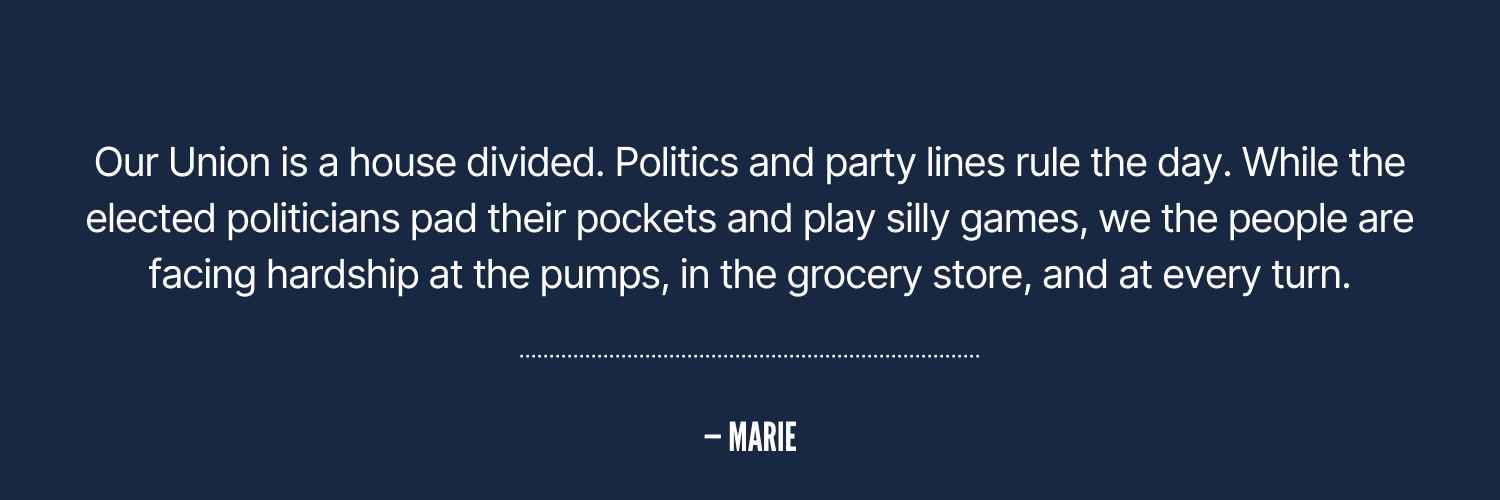
Let’s be honest: the State of the Union address these days looks a lot like a Hollywood awards show. Lots of self-congratulations, drama, selfies, and fur-collared jackets (what was that?). What it isn’t is a serious approach to the many challenges we face as a nation. Is it any surprise that only about 16% of us even watch this hyper-partisan affair? Incidentally, that’s about the same percentage of Americans who vote in party primaries, which tells you almost everything you need to know.
We’re political peeps, so of course we tuned in. We’ll give President Biden some props for his emphasis on bipartisanship. We’re totally on board with that. But why does the President of the United States have to plead for bipartisanship? Because it so rarely happens. And why is that? Because there is no electoral incentive for lawmakers to cooperate. The R and D brands are tarnished, the trust is broken, and the current system doesn’t allow any new options to try another way. It’s exasperating.
We asked you to share the state of the Union from your perspective, and we were overwhelmed by the response. Here are a few that we received:


Despite the often rosy picture painted by the president last week, clearly a remnant of bygone days, the SOTU showed how far from bipartisanship we actually are. Which is why the most bipartisan (multipartisan!) thing we can do is push for electoral reforms that would introduce competition and improve the system for all Americans — red, blue, or one of the many shades of purple in between. As you’ll see in our featured views below, there’s room for the entire political spectrum…and younger voters are on board too.
-
Biden, in State of the Union, mixes bipartisanship with defiance —The Washington Post
-
Most in new poll say Biden hasn’t achieved much in first two years —ABC News
-
Christie Whitman hits Dems and Republicans in call for new political party —NJ.com
-
Michael Steele: Rising above gridlock to govern —Peter G. Peterson Foundation
OTHER NEWS & VIEWS
From the left: Ending the partisan tug of war
“America has a two-party political system that encourages candidates to appeal, first and foremost, to members of their own party—while locking out independents, third parties, and other sources of competition. For the most part, instead of working together to solve the nation’s problems, the two major parties engage in an endless tug of war. Disagreement is to be expected in a democracy, but at the end of the day, representatives should be motivated to find areas of agreement and to pass legislation that the public supports.” —Alex Tausanovitch from Center for American Progress
From the right: Why ranked-choice voting?
“So, what do you do to counter the legislature of a state that has been captured by extremists? Instead of spinning your wheels trying to put out a myriad of culture war fires, it would make sense to attack the root cause of the problem—the method of selecting the people who orchestrate the divisiveness and chaos.” —Jim Jones in The Hill
From Gen Z: Restore real competition with RCV
“Growing up in an era of hyperpartisanship and political instability, fewer Gen Z Americans now identify with either the Democratic or Republican party than any previous generation. Americans have broadly checked out from the two-party system, but Gen Z in particular is notable for its political independence. As Connecticut lawmakers push for a state voting rights act to protect our right to vote, CT Voters First is urging that they also consider the value of what they are protecting. Non-competitive elections remove incentives for lawmakers to even listen to their constituents since they already know they will win re-election based on their party affiliation. We cannot expect young voters to be enthusiastic about voting and democracy when they know the outcome of every election before it happens. RCV will restore competition to our elections which will, in turn, restore incentives for our lawmakers to listen to their constituents. It gives voters the freedom to vote their conscience without fear of ‘spoiling’ an election or ‘wasting’ their vote.” —Holden Culotta in CT Examiner
As the Florida Political Review recently wrote, “Reining in party polarization will be essential to maintaining our democracy.” We couldn’t agree more. That puts Forward squarely on the side of not only democracy but also the vast majority of the American people, who get that political theater doesn’t solve the problems that affect us—it only creates more of them. And that’s the real state of the Union.
Do you like this page?
